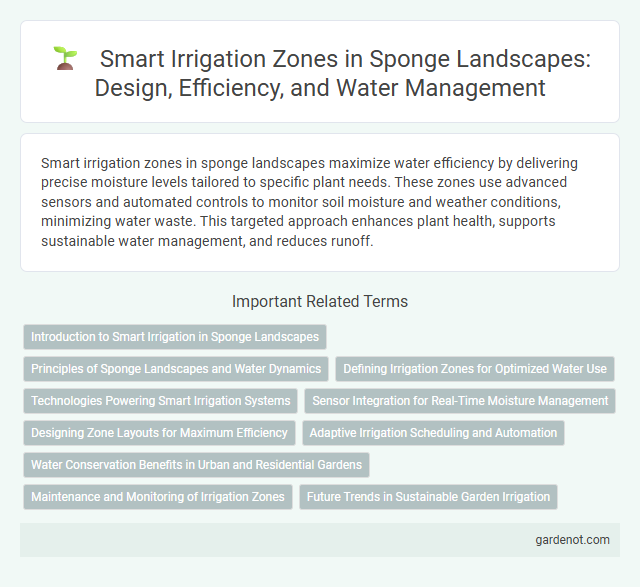Smart irrigation zones in sponge landscapes maximize water efficiency by delivering precise moisture levels tailored to specific plant needs. These zones use advanced sensors and automated controls to monitor soil moisture and weather conditions, minimizing water waste. This targeted approach enhances plant health, supports sustainable water management, and reduces runoff.
Introduction to Smart Irrigation in Sponge Landscapes
Smart irrigation zones in sponge landscapes use advanced sensors and weather data to optimize water delivery, reducing runoff and improving soil moisture retention. These systems integrate real-time monitoring to adapt irrigation schedules based on rainfall, evapotranspiration rates, and soil conditions, ensuring efficient water use. Implementing smart irrigation enhances sustainability by promoting groundwater recharge and supporting resilient urban green infrastructure.
Principles of Sponge Landscapes and Water Dynamics
Smart irrigation zones in sponge landscapes optimize water absorption and retention by mimicking natural hydrological processes, enhancing groundwater recharge and reducing surface runoff. These zones employ permeable soil layers and vegetation strategically arranged to maximize infiltration and slow water flow, aligning with the principles of sponge landscapes that emphasize rainwater harvesting and sustainable water cycles. Effective water dynamics management in these zones ensures resilient urban ecosystems capable of mitigating flooding while supporting plant health and biodiversity.
Defining Irrigation Zones for Optimized Water Use
Defining irrigation zones within a sponge landscape allows precise control over water distribution, targeting specific soil types and vegetation needs to enhance water efficiency. Smart irrigation systems use sensors and data analytics to adjust watering schedules based on real-time moisture levels, weather conditions, and plant requirements. This optimized approach reduces runoff and promotes deeper infiltration, supporting sustainable urban water management.
Technologies Powering Smart Irrigation Systems
Smart irrigation zones leverage IoT sensors, weather data analytics, and real-time soil moisture monitoring to optimize water usage in sponge landscapes. Advanced technologies such as automated valve controls and machine learning algorithms adjust irrigation schedules based on environmental conditions, reducing water waste and enhancing plant health. Integration with cloud platforms allows remote management and data-driven insights for efficient water resource management.
Sensor Integration for Real-Time Moisture Management
Smart irrigation zones utilize advanced sensor integration to monitor soil moisture levels in real-time, allowing precise water application based on current conditions. These sensors detect moisture variations and relay data to automated systems, optimizing water usage and promoting sustainable landscape health. Implementing this technology in sponge landscapes enhances water retention and supports efficient irrigation management.
Designing Zone Layouts for Maximum Efficiency
Designing smart irrigation zones for sponge landscapes involves strategically grouping plants with similar water needs to optimize water usage and reduce runoff. Incorporating soil moisture sensors and weather data allows for precise scheduling, ensuring that each zone receives the right amount of water at the right time. Efficient zone layouts not only conserve water but also enhance the landscape's ability to absorb and retain stormwater, improving overall sustainability.
Adaptive Irrigation Scheduling and Automation
Smart irrigation zones utilize adaptive irrigation scheduling and automation to optimize water usage based on real-time soil moisture data and weather conditions. These systems adjust watering frequency and duration dynamically, reducing water waste and promoting healthier plant growth within a sponge landscape. Integration with sensors and IoT devices enhances precision, ensuring efficient irrigation tailored to specific landscape needs.
Water Conservation Benefits in Urban and Residential Gardens
Smart irrigation zones in sponge landscapes significantly enhance water conservation by precisely controlling irrigation schedules and amounts, reducing runoff and evaporation in urban and residential gardens. These systems use soil moisture sensors and weather data to optimize water use, ensuring plants receive only the necessary moisture levels. Efficient water management in sponge landscapes supports sustainable landscaping practices and reduces strain on municipal water supplies.
Maintenance and Monitoring of Irrigation Zones
Smart irrigation zones in sponge landscapes utilize advanced sensors and automated controls to optimize water distribution, reducing runoff and enhancing soil absorption. Continuous monitoring of moisture levels and system performance helps detect leaks, blockages, or malfunctioning components early, ensuring efficient water use and maintaining landscape health. Routine maintenance includes cleaning filters, calibrating sensors, and adjusting irrigation schedules based on weather data and plant needs to sustain optimal functionality.
Future Trends in Sustainable Garden Irrigation
Smart irrigation zones integrate advanced sensors and AI technology to optimize water usage in sponge landscape gardens, reducing waste and promoting sustainability. Future trends emphasize real-time soil moisture monitoring and climate-adaptive systems that adjust irrigation schedules based on weather forecasts and plant needs. These innovations contribute to efficient water management and support resilient, eco-friendly garden ecosystems.
Smart irrigation zone Infographic

 gardenot.com
gardenot.com